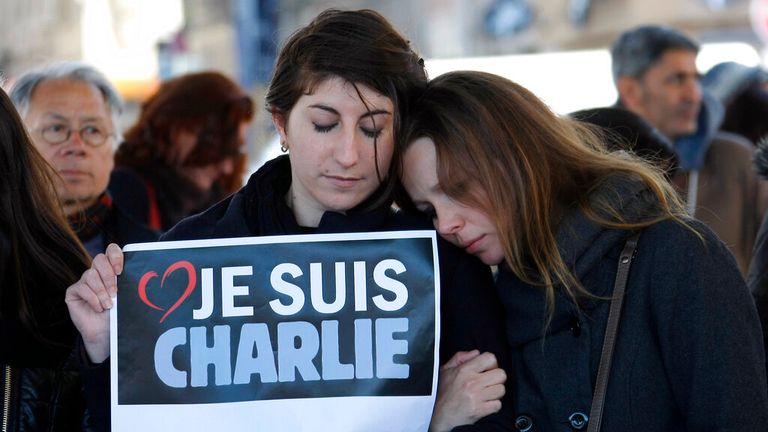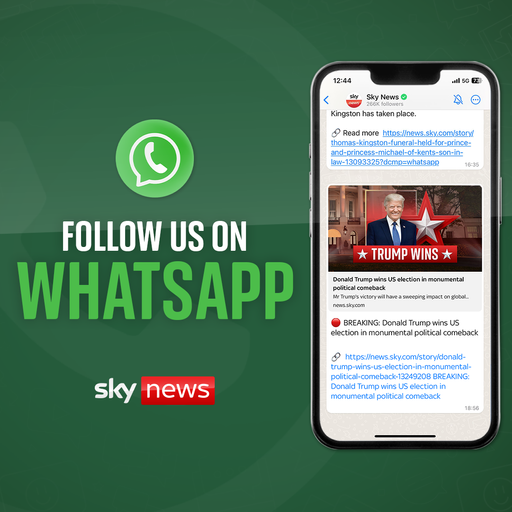‘Je Suis Charlie’ was the slogan after 2015 Charlie Hebdo attack – a decade on, has anything changed?
Twelve people were killed in 2015 when a pair of terrorists who had declared their allegiance to al Qaeda burst into Charlie Hebdo’s Paris office and opened fire with assault rifles.

The resonance of the name Charlie Hebdo still rings loudly, a decade after the horrific attack on its offices. But the questions it raised have still not been answered.
That day, twelve people were killed, eight of them members of the magazine’s staff, when a pair of terrorists stormed into the offices, in central Paris, and opened fire with assault rifles. Eleven others were injured.
The pair were brothers, Said and Cherif Kouachi, who had been born in France but declared their allegiance to al Qaeda. They fled the scene, sparking an enormous manhunt that ended when they were killed two days later.
The French nation appeared united in shock and disgust, the attack seen as an assault on the nation’s history of secularism and free speech. But this was not a random act of terrorism. Charlie Hebdo was targeted, very specifically.
The magazine had published a series of cartoons depicting the Prophet Muhammad. In 2011, after renaming itself Sharia Hebdo for one issue, the magazine’s offices were firebombed. The following year it printed a series of cartoons of the prophet, including one where Muhammad was naked.
Charlie Hebdo became the focus of a series of plots. Al Qaeda added its editor, Stephane Charbonnier, to a list of the terrorist organisation’s prime targets. And then, on 7 January, 2015, the Kouachi brothers broke into the office and carried out their attack.
Read more: How the Charlie Hebdo attack unfolded
Two days later, they were both killed by the police after trying to take refuge in a printworks 20 miles outside Paris. They left the building, firing at officers, having previously declared they wanted to die as martyrs.
Just as the police were surrounding that building, an accomplice of the brothers, named Amedy Coulibaly, stormed a kosher supermarket in Paris and held staff and prisoners hostage.
Coulibaly, who had shot dead a policewoman the previous day, was killed when police entered the building, freeing 15 hostages but also recovering the bodies of four victims.
‘Je Suis Charlie’
In the aftermath of the violence, millions took to the streets to offer support.
“Je Suis Charlie” became a slogan. Politicians proclaimed their unconditional support for free speech.
But did anything change?
Certainly, the Charlie Hebdo attacks did not mean an end to terrorist attacks in France – later that year, Paris would suffer another devastating day when 130 people were killed during a series of attacks attributed to Islamic State (ISIS).
The magazine is still going, albeit the huge surge in popularity it received after the attack has now faded.
And it’s still courting controversy – this latest issue includes yet more provocative images, more works that it maintains are light-hearted impudence, but which others will maintain are profoundly offensive.
The intervening years have seen a gradual lull in global terrorism, not least because of the decline of al Qaeda and ISIS.
Read more from Sky News:
Trudeau resigns as Canadian PM
Trump’s victory certified by Harris
But just as this anniversary was on its way, so there have been signs that these groups are resurgent – ISIS loyalists killed 154 people at a pop concert in Moscow, more than 100 in a single attack in Iran and targeted a Taylor Swift concert in Vienna.
And at the end of the year came the New Orleans attack, where 14 people were killed when a truck was driven into a crowded street. An ISIS flag was attached to the vehicle.
Al Qaeda, too, is regrouping, having built a string of training camps in Afghanistan. The return of Taliban control has given the group safe havens that it previously lacked.
Antisemitism now feels more tangible than it has for decades.

Speaking after the attack on the kosher supermarket, Francois Hollande, then the French President, described it as “a terrifying act of antisemitism”.
Now, across Europe, around 80% of Jews believe that the problem of antisemitism is getting worse, not better.
Free speech debate
What hasn’t changed is the nebulous, nervous debate about the limits of free speech.
Charlie Hebdo has continued to berate the French political establishment, insisting that the fear of upsetting France’s Muslim population, the biggest in Europe, has stymied political debate about social problems.
“The French left has beaten all the records of cowardice and denial,” claims Laurent Sourisseau, the magazine’s director and himself a survivor of the attack. And this from a magazine that has always positioned itself on the political left.
But that claim – that the political establishment is paralysed by a fear of creating offence – is now one heard routinely from those on the far right, and most loudly amplified by Elon Musk.
Be the first to get Breaking News
Install the Sky News app for free


Today, France will reflect on all this, but mainly on those who died in the offices of Charlie Hebdo, killed as they sat down to talk through their ideas for the next issue.
Even now, the police are protecting staff, survivors and even the partners of those who were killed.
Emmanuel Macron will lead tributes and will attend ceremonies in memory of the magazine staff, as well as the police officer, Ahmed Merabet, who was killed as the terrorists fled, and four people murdered at the kosher supermarket two days later.
“We know terrorism is a risk that remains prevalent in our society, and it requires no let-up and needs collective vigilance,” said Macron.
“There must be no respite in the fight against terrorism.”



